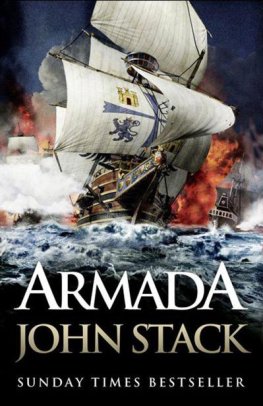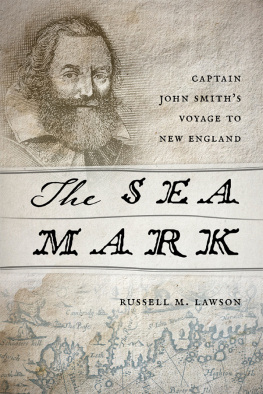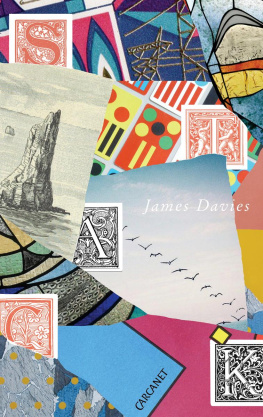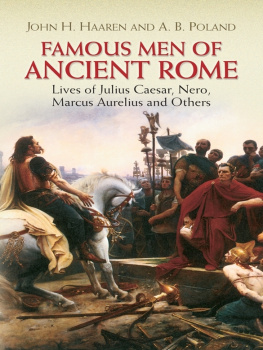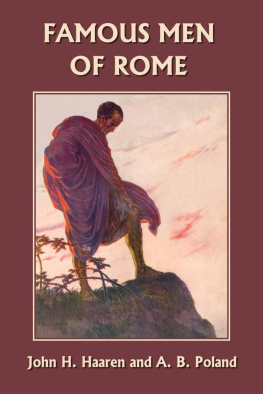John Stack - Captain of Rome
Here you can read online John Stack - Captain of Rome full text of the book (entire story) in english for free. Download pdf and epub, get meaning, cover and reviews about this ebook. genre: Adventure. Description of the work, (preface) as well as reviews are available. Best literature library LitArk.com created for fans of good reading and offers a wide selection of genres:
Romance novel
Science fiction
Adventure
Detective
Science
History
Home and family
Prose
Art
Politics
Computer
Non-fiction
Religion
Business
Children
Humor
Choose a favorite category and find really read worthwhile books. Enjoy immersion in the world of imagination, feel the emotions of the characters or learn something new for yourself, make an fascinating discovery.

- Book:Captain of Rome
- Author:
- Genre:
- Rating:3 / 5
- Favourites:Add to favourites
- Your mark:
- 60
- 1
- 2
- 3
- 4
- 5
Captain of Rome: summary, description and annotation
We offer to read an annotation, description, summary or preface (depends on what the author of the book "Captain of Rome" wrote himself). If you haven't found the necessary information about the book — write in the comments, we will try to find it.
John Stack: author's other books
Who wrote Captain of Rome? Find out the surname, the name of the author of the book and a list of all author's works by series.
Captain of Rome — read online for free the complete book (whole text) full work
Below is the text of the book, divided by pages. System saving the place of the last page read, allows you to conveniently read the book "Captain of Rome" online for free, without having to search again every time where you left off. Put a bookmark, and you can go to the page where you finished reading at any time.
Font size:
Interval:
Bookmark:
John Stack
Captain of Rome
CHAPTER ONE
Battle speed!
The Aquila sprung to life at Atticuss shouted command, the ram-tipped bow of the Roman trireme slicing cleanly through the wave tops as the galley accelerated to seven knots, the drum masters beat commanding the actions of two hundred chained slaves, a multitude working as one. The order was repeated on the aft-decks of the galleys surrounding the Aquila and the captain noted with satisfaction that the once inexperienced crews of the ships flanking his own now moved with alacrity and purpose. There were thirty galleys in total, each one based on the new cataphract design, although the Aquila bore subtle differences that set her apart and spoke of her experience; healed scars from forgotten skirmishes, timbers weathered by a hundred storms.
Two points to starboard! Atticus commanded.
Gaius, the helmsman, adjusted the Aquilas trim, lining her up with the centre of the harbour mouth.
The Carthaginian-held port town of Thermae was nestled neatly beyond the enfolding headlands that protected the inner waters, her docks home to a fleet of enemy galleys and transport ships, their number beyond counting. Atticus moved to the side rail of the aft-deck, leaning out to look beyond the corvus boarding ramp that now dominated the foredeck of the Aquila. He instinctively cursed the unsightly device, its bulk out of place on the otherwise unobstructed foredeck, the arrow-like lines of the galley distorted by the new addition.
Mastheadreport! Atticus shouted, his green eyes drawn upwards to the lookout and the figure of Corin standing precariously over the lifting yard fifty feet above. The youngest member of the crew was a fellow Greek from the city of Locri. His eyesight was akin to an eagle and he paused before replying to confirm his estimate.
No more than ten galleys! One quinquereme! Roughly twenty transport ships!
Atticus nodded and turned to search for Lucius, his second-in-command. The familiar figure was striding across the aft-deck, his restless eyes continually ranging over the deck of the Aquila, noting every action of the crew, his forty-five years resting easily on his solid frame.
You there, Baro? he roared as he went, One cubit on the starboard aft running line. The crewman reacted instantly, two additional men rushing to his aid as the sail was given an extra degree of tautness.
Atticus nodded to Lucius who immediately came to his captains side.
Whats your assessment Lucius? he asked, drawing on the older mans experience; a knowledge that seemed to encompass many lifetimes.
Its exactly as reported. One squad. Minimal activity. Lucius replied with a scowl, his expression troubled.
And Atticus prompted, sensing the unease.
When have you ever known a report to be so exact, Captain?
Atticus nodded, considering Luciuss unspoken opinion. Since the Roman victory at Mylae three months before, all enemy activity on the northern coast of Sicily had dissipated, both on land and sea, and the Roman transports plying weekly from Brolium to Rome sailed unhindered through empty sea lanes.
Atticus looked to port and the rapidly rising sun an hour above the eastern horizon. It shone white behind a veil of light cloud and the surface of the sea split the morning light into a million shards, glare upon glare until Atticus was forced to look away, blinking rapidly to clear his vision. He looked starboard to an equally empty western horizon, the shoreline bleeding away until it was lost behind the curve of a distant headland. It was as if the Carthaginians had all but abandoned northern Sicily to the Romans.
Well, Captain? Atticus heard, turning to see Titus Aurelius Varro, the tribune and commander of the attack fleet of thirty galleys, crossing the aft-deck towards him, leaving a huddled group of four senators in his wake.
Enemy numbers as reported, Tribune. Atticus replied, the tone of his words voicing his underlying uncertainty.
Excellent! Varro replied, slapping his hands together, not understanding the sub-text. Well then, ready the ship for battle.
Yes, Tribune. Atticus saluted, his face betraying none of his inner thoughts.
Titus Aurelius Varro was a young man, not yet twenty, but his father was a senior senator and magistrate and it was rumoured amongst the fleet commanders that he had paid a kings ransom for his sons commission. Atticus could only marvel at how fast fortune had transformed the Roman navy. Less than six months ago it was a provincial force of a dozen galleys and the sailors and marines who served in her ranks were treated with contempt by the vaulted legions of the Republic. Now the Classis Romanus, the Roman Fleet, numbered over two hundred galleys, both Roman and captured Carthaginian and the command of her forces was sought after by the elite of Roman society. It was for this reason also, Atticus suspected, that Varro had chosen the Aquila as his flagship, no doubt hoping to emulate the success of Gaius Duilius, Consul of the Roman Senate, who had sailed on the Aquila at Mylae.
Atticus turned to Lucius and repeated the tribunes order. Within a minute the lifting yard of the mainsail was lowered and the huge canvas was furled and made secure. The lifting yard was quickly re-raised to half mast and swung through ninety degrees to be fastened parallel to the mainmast. The galleys surrounding the Aquila noted the action, the signal of commitment to battle and they followed suit, the order rippling down along the line.
The fleet of thirty galleys tightened up as the harbour mouth approached, an unconscious movement that sharpened the thin edge of the arrow head formation, the manoeuvre bunching the ships together, coiling the energy of their advance, a deadly force that would be unleashed on the unprepared enemy at Thermae.
The rhythmic beat of ten thousand footfalls filled the valley floor, the sound overlain with sporadic clinks of metal on metal as equipment and kit swayed with the repetitive march of five thousand legionaries. Forty maniples of the Ninth Legion had been assigned the task of securing the town of Thermae. They were the Wolves of Rome, a legion of men who carried with them a near fanatical lust for revenge against the Carthaginian foe who had humiliated them at Makella only months before. The Punici had brought the Ninth to their knees under the double burden of starvation and pestilence, isolating them in hostile territory. The Carthaginian blockade of Sicily had cut the legions off from the supplies of Rome and it was only the naval victory at Mylae that released the stranglehold, and freed the soldiers.
With the threat of starvation lifted the Ninth had slowly regained its strength, the influx of men and equipment, of food and supplies, sweeping away the last vestiges of weakness and vulnerability. The legionaries had kept the wounds open however, constantly picking at the scab to reveal the raw flesh beneath, never allowing the pain to abate fully less they forget the measure of revenge owed to them. Their wound could only be cauterised in the heat of battle, sealed with the blood of their enemy.
Septimus Laetonius Capito, marine centurion of the Aquila, marched with the IV maniple. At six foot four inches and two-hundred and twenty pounds, he stood tall in the front rank but his stride was marked by a slight limp, an injury suffered at Mylae when his demi-maniple of sixty legionaries swept the main deck of the Carthaginian flagship in that bitter and hard-won fight. After the battle Septimus had been amongst the first relief column to reach Makella and rescue the Ninth, the fulfilment of an oath to the man now marching beside him, Marcus Fabius Buteo, centurion of the IV and Septimuss old commander before he had transferred to the marines. Marcus had a dozen years and a hundred battles on Septimus but his stride matched the youngest men of the legion and his will and discipline outstripped them all.
Font size:
Interval:
Bookmark:
Similar books «Captain of Rome»
Look at similar books to Captain of Rome. We have selected literature similar in name and meaning in the hope of providing readers with more options to find new, interesting, not yet read works.
Discussion, reviews of the book Captain of Rome and just readers' own opinions. Leave your comments, write what you think about the work, its meaning or the main characters. Specify what exactly you liked and what you didn't like, and why you think so.

